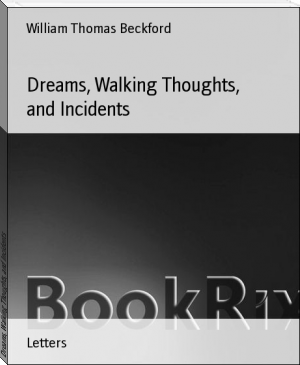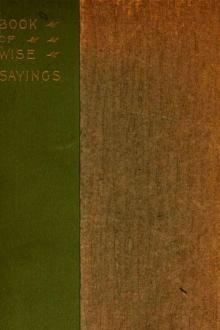Dreams, Walking Thoughts, and Incidents, William Thomas Beckford [books for men to read txt] 📗

- Author: William Thomas Beckford
Book online «Dreams, Walking Thoughts, and Incidents, William Thomas Beckford [books for men to read txt] 📗». Author William Thomas Beckford
To these I joined myself, and fell down on the steps before the shrine. The sunbeams had not yet penetrated into this religious quarter; and the only light it received proceeded from the golden lamps, which hang in clusters round the sanctuary. A lofty altar, decked with superstitious prodigality, conceals the holy pile from profane glances. Those who are profoundly touched with its sanctity may approach, and walking round, look through the crevices of the tomb, and rub their noses against the identical bones of St. Anthony, which, it is observed, exude a balsamic odour. But supposing a traveller ever so heretical, I would advise him by no means to neglect this pilgrimage; since every part of the recess he visits is decorated with the most exquisite sculptures. Sansovino and the best artists have vied with each other in carving the alto relievos of the arcade, which, for design and execution, would do honour to the sculptors of antiquity.
Having observed these objects with much less exactness than they merited, and acted perhaps too capital a part amongst the devotees, I hastened to the inn, luckily hard by, and one of the best I am acquainted with. Here I soon fell asleep in defiance of sunshine. 'Tis true my slumbers were not a little agitated. St. Anthony had been deaf to my prayer, and I still found myself a frail, infatuated mortal.
At five I got up; we dined, and afterwards, scarcely knowing, nor much caring, what became of us, we strolled to the great hall of the town; an enormous edifice, as large as that of Westminster, but free from stalls, or shops, or nests of litigation. The roof, one spacious vault of brown timber, casts a solemn gloom, which was still increased by the lateness of the hour, and not diminished by the wan light, admitted through the windows of pale blue glass. The size and shape of this colossal chamber, the coving of the roof, with beams like perches for the feathered race, stretching across it, and, above all, the watery gleams that glanced through the casements, possessed my fancy with ideas of Noah's ark, and almost persuaded me I beheld that extraordinary vessel. The representation one sees of it in Scheutzer's "Physica Sacra" seems to be formed upon this very model, and for several moments I indulged the chimera of imagining myself confined within its precincts. How willingly, could I but choose my companions, would I encounter a deluge, to float whole years instead of months upon the waves!
We remained walking to and fro in the ark, till the twilight faded into total darkness. It was then full time to retire, as the guardian of the place was by no means formed to divine our diluvian ideas.
LETTER XII
September 6th.--At Padua, I was too near the last and one of the most celebrated abodes of Petrarch, to make the omission of a visit excusable; had I not been in a disposition to render such a pilgrimage peculiarly pleasing. I set forwards from Padua after dinner, so as to arrive some time before sunset. Nothing could be finer than the day; and I had every reason to promise myself a serene and delicious hour, before the sun might go down. I put the poems of Petrarch into my pocket; and, as my road lay chiefly through lanes, planted on either side with mulberries and poplars, from which vines hung dangling in careless festoons, I found many a bowering shade, where I sat, at intervals, to indulge my pensive humour over some ejaculatory sonnet; as the pilgrim, on his journey to Loretto, reposes here and there, to offer his prayers and meditations to the Virgin. In little more than an hour and half, I found myself in the midst of the Euganean hills, and, after winding almost another hour amongst them, I got, before I was well aware, into the village of Arqua. Nothing can be more sequestered or obscure than its situation. It had rather a deserted appearance; several of its houses being destitute of inhabitants, and crumbling into ruins. Two or three of them, however, exhibited ancient towers, richly mantled with ivy, and surrounded with cypress, that retained the air of having once belonged to persons of consideration. Their present abandoned state nourished the melancholy idea with which I entered the village. Could one approach the last retreat of genius, and not look for some glow of its departed splendour?
"Dear to the pensive eye of fond regret, Is light still beaming from a sun that's set."
The residence of Petrarch at Arqua is said to have drawn thither from Padua the society of its more enlightened citizens. This city, whilst Petrarch lived in its neighbourhood, was engaged in rebellion against the Venetians; and Francis de Carrara, the head of it, went often to Arqua, to consult Petrarch; when he found himself obliged to sue to Venice for peace. The poet was indeed deputed, upon this occasion, his ambassador to the state; as being a person whose character and credit were most likely to appease its wrath. His success in this embassy might, perhaps, have been some recompense for an employment he accepted with much regret, as it forced him from his beloved retirement. In a letter to one of his friends, written about this period of his life, he says: "I pass the greatest part of the year in the country, which I have always preferred to cities: I read; I write; I think: thus, my life and my pleasures are like those of youth. I take pains to hide myself; but I cannot escape visits: it is an honour which displeases and wearies me. In my little house on the Euganean hills, I hope to pass my few remaining days in tranquillity, and to have always before my eyes my dead, or my absent, friends." I was musing on these circumstances as I walked along the village, till a venerable old woman, seated at her door with her distaff in her hand, observing me, soon guessed the cause of my excursion; and offered to guide me to Petrarch's house. The remainder of my way was short, and well amused by my guide's enthusiastic expressions of veneration for the poet's memory; which, she assured me, she felt but in common with the other inhabitants of the village. When we came to the door of the house, we met the peasant, its present possessor. The old woman, recommending the stranger and his curiosity to her neighbour's good offices, departed. I entered immediately, and ran over every room, which the peasant assured me, in confirmation of what I before learnt from better authority, were preserved, as nearly as they could be, in the state Petrarch had left them. The house and premises, having unfortunately been transmitted from one enthusiast of his name to another, no tenants have been admitted, but under the strictest prohibition of making any change in the form of the apartments, or in the memorial relics belonging to the place: and, to say the truth, everything I saw in it, save a few articles of the peasant's furniture in the kitchen, has an authentic appearance. Three of the rooms below stairs are particularly shown, and they have nothing in them but what once belonged to the poet. In one, which I think they call his parlour, is a very antique cupboard; where, it is supposed, he deposited some precious part of his literary treasure. The ceiling is painted in a grotesque manner. A niche in the wall contains the skeleton of his favourite cat, with a Latin epigram beneath, of Petrarch's composition. It is good enough to deserve being copied; but the lateness of the hour did not allow me time. A little room, beyond this, is said to have been his study: the walls of it, from top to bottom, are scribbled over with sonnets, and poetical eulogies on Petrarch, ancient and modern: many of which are subscribed by persons, of distinguished rank and talents, Italians as well as strangers. Here, too, is the bard's old chair, and on it is displayed a great deal of heavy, ornamental carpentry; which required no stretch of faith to be believed the manufacture of the fourteenth century. You may be sure, I placed myself in it, with much veneration, and the most resigned assent to Mrs. Dobson's relation: that Petrarch, sitting in this same chair, was found dead in his library, with one arm leaning on a book. Who could sit in Petrarch's chair, void of some effect? I rose not from it without a train of pensive sentiments and soft impressions; which I ever love to indulge. I was now led into a larger room, behind that I first saw; where, it is likely enough, the poet, according to the peasant's information, received the visits of his friends. Its walls were adorned with landscapes and pastoral scenes, in such painting as Petrarch himself might, and is supposed to have executed. Void of taste and elegance, either in the design or colouring, they bear some characteristic marks of the age to which they are, with no improbability, assigned; and, separate from the merit of exhibiting repeatedly the portraits of Petrarch and Laura, are a valuable sketch of the rude infancy of the art, where it rose with such hasty vigour to perfection. Having seen all that was left unchanged in this consecrated mansion, I passed through a room, said to have been the bard's bed-room, and stepped into the garden, situated on a green slope, descending directly from the house. It is now rather an orchard than a garden; a spot of small extent, and without much else to recommend it, but that it once was the property of Petrarch. It is not pretended to have retained the form in which he left it. An agreeably wild and melancholy kind of view, which it commands over the Euganean hills, and which I beheld under the calm glow of approaching sunset, must often, at the same moment, have soothed the poet's anxious feelings, and hushed his active imagination, as it did my own, into a delicious repose. Having lingered here till the sun was sunk beneath the horizon, I was led a little way farther in the village, to see Petrarch's fountain. Hippocrene itself could not have been more esteemed by the poet, than this, his gift, by all the inhabitants of Arqua. The spring is copious, clear, and of excellent water; I need not say with what relish I drank of it. The last religious act in my little pilgrimage was a visit to the church-yard; where I strewed a few flowers, the fairest of the season, on the poet's tomb; and departed for Padua by the light of the moon.
LETTER XIII
September 7th.--Immediately after breakfast, we went to St. Justina's, a noble temple, designed by Palladio, and worthy of his reputation. The dimensions are vast, and the equal distribution of light and ornament truly admirable. Upon my first entrance, the long perspective of domes above, and chequered marble below, struck me with surprise and pleasure. I roved about





Comments (0)